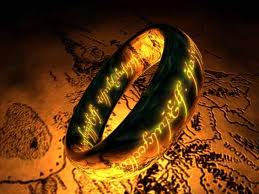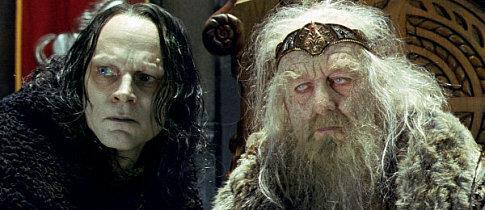One Ring to rule them all,
One Ring to find them
One Ring to bring them all and
in the darkness bind them
In the Land of Mordor where the Shadows lie.
This piece, that originally appeared on The Occidental Observer (here), is reproduced below minus a couple of sentences mentioning the 9/11 attacks:
Lords of the Ring
by Michael Colhaze
Many moons ago and for a few years only, I wore my locks long and sported colourful garb and roamed the psychedelic haunts of Paris, London or Amsterdam, usually holding a joint in one hand while employing the other to underline with languid gestures my latest concept of how to bring instant peace and love to the world. As for my fellow freaks and hippies, most subsisted on very little, at least money-wise, but nearly all had pets, the latter named frequently after a brand of heroes much en vogue during those innocent times. For cats, Galadriel stood high on the agenda, also Arwen and Legolas. In Amsterdam my next-door neighbour, a middle-aged lady with henna-dyed hair, flowing dresses and tinkling bells around one fat ankle, owned a huge tomcat called Gollum. When he was one day run over by a lorry, she came and cried bitterly into my lap. I did my best to comfort her, though secretly rejoiced because the cunning bastard, nomen est omen, used to be a veritable bane for the local sparrows and blackbirds, and long since had I weighed means of abandoning him in a far-away place without coming under suspicion. As for dogs, I remember a Frodo, Bilbo and Pippin, also one Boromir, him a mighty Leonberger and the gentlest fellow I’ve ever met.
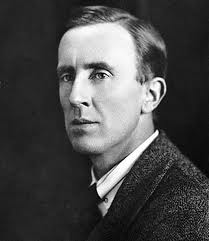
J.R.R. Tolkien
Which gives you an idea of how much Tolkien’s arrant epos was on our mind during those happy years. Wherever you came, you found in the bookshelves from cardboard boxes or orange crates at least one copy, usually a weighty paperback falling apart from much use. Walls were hung with coloured maps of Middle Earth, and Gandalf was a household name for anything from an Underground publication to a short-lived artistic society. Depending on fantasy and imagination, and perhaps also on the daily cannabis consume, an inordinate number of people identified with a member of the Fellowship, or wished fervently for the return of the King, or would have retired into the Shire without looking back even once.
On the other hand there were some, myself included, who had enjoyed the book but found it somewhat lacking in psychological depth. It was, after all, a monumental canvas painted largely in black and white, with protagonists either amazingly valiant, handsome and noble or the absolute opposite, namely unspeakably ugly and wicked. Which made the tale rather predictable and deprived it of the complex emotional touch that otherwise would have found a way into the heart. Still, Tolkien’s power of imagination cannot and will not be denied, and for his excuse it must be said that he relied much on the High Germanic saga like Edda or the Nibelungen, and that those were on the whole magnificent exemplifications of the eternal battle between Good and Evil. A battle where tads of intellectual embroidery might have seemed misplaced.
Yet under the heroic plainness hid an aspect that intrigued me and many of my friends considerably, namely the deeper meaning behind the fantasy. Because, as we all agreed, there had to be one since the tale was simply too carefully thought out to be without one. Never mind that the ghastly Sauron, title figure and main protagonist aiming to enslave the world and mankind particularly, didn’t turn up personally during the proceedings. But his presence is overwhelmingly felt, and he had to have an equivalent within the recent history of man, and as such a name that made sense.
First in line was of course Adolf Hitler, temporal saviour of a betrayed, ruined and starving Germany robbed naked by the Versailles victors, but for the rest and according to the New York Times the biggest blackguard ever to set foot on our sacred earth. Next came good old Joe Stalin, mass murderer par excellence supported by a closely knit clan of henchmen as described and defined by the great Solzhenitsyn in his Gulag and Two Hundred Years Together. Then the fabulous Chairman Mao, who most likely holds the Guinness record for accumulated corpses worldwide. And finally the inventors of the nuke, embodied by one Robert Oppenheimer who paid, just like that abominable fraud Freud, with lung cancer and a slow and painful death for his sins.
But try as you might, none of the above really made sense. One reason was of course that Tolkien had begun The Lord of the Rings already in the mid-thirties, long before those villains blossomed medially into full bloom.
As to the ring itself, what kind of power did it exactly wield? It was, this we know, potent enough to enslave the lesser ones, but not all-powerful. Because long ago Isildur King of Gondor, in a desperate attempt to stem the advance of the Orcs, had offered battle to Sauron their chieftain. And in a one-to-one succeeded with God’s help to cut off the latter’s hand which bore the ring. A feat that routed the Dark One and his hosts, at least for a while and until he tried another grab at the hideous thing.
My understanding of Tolkien’s political leanings is scant. He himself has, as far as I know, refused to give any clues. But there are hints. It is rumoured that he considered General Franco rather emphatically as the saviour of Catholic Spain, a view much at odds with contemporaries like that heartless hunter, boozer and scribbler Hemingway and his liberal chums. One of Tolkien’s close friends, the writer and poet Roy Campbell, had witnessed the atrocities committed by Marxist death squads against priests and nuns in Córdoba and described them in vivid detail. What makes him interesting in this context is that he also contributed articles to The European, a fascist gazette run by Lady Diana Mosley, wife of Sir Oswald and, as James Lees-Milne described her, “the nearest thing to Botticelli’s Venus as I have ever seen.” Ezra Pound, among others, was a fellow contributor to The European.
The latter should have rung a bell, but didn’t. Nearly twenty years had to pass before bits and pieces fell into place, at least within my much limited perception. One was an exhibition, the other a production of Wagner’s Ring.
The exhibition was staged in Frankfurt by one of the more affluent art establishments, meaning that decent Fizz, snacks with French pâté and a few interesting people could be expected on the eve of its grand opening. Which was the reason, some curiosity apart, why an old friend took me there. Both of us have no truck with Modern art and knew the artist only vaguely by name. Lucien Freud it was, grandson of you-know-who, and his hams about as uplifting as a dead rat under the sink. As we stood in front of one [painting], an uncouth male nude reclining on a smutty bedstead with legs spread wide open while scratching reddish genitals dangling above a cavernous anus, my friend cast a look around and said: “Grand Orc of the Crap Arts! Never had any sense of beauty, and never will!”
A remark that transported me immediately into a more sunny and innocent past, but also made me decline any comment. Because this was after all Germany, a country ruled by politically correct criminals that long since have booted the freedom of expression as laid down in the constitution, and who slap you for years on end into the cooler if you dare to insist on it.
Damned be the Ring I forged with a Curse!
Though the Gold gave me unlimited Might
Now its Sorcery has brought me Ruin!
The Rhinegold, 3rd Scene
About a week later I saw, and heard, Richard Wagner’s Ring of the Nibelung. I have no intention, and lack the intellectual acumen, to give this masterwork its proper due. George Bernhard Shaw, in his essay The Perfect Wagnerite, has summed it up like this: “Only those of a wider consciousness can follow it breathlessly, seeing in it the tragedy of human history and the whole horror of the dilemma from which the world is shrinking today.”
Dilemma? Horror? Shaw did not enter into detail as to the above, but the composer himself was more forthcoming.
You ask me about Jewry. I felt a long-repressed hatred for them, and this hatred is as necessary to my nature as gall is to blood. An opportunity arose when their damnable scribbling annoyed me most, and so I broke forth at last. It seems to have made a tremendous impression, and that pleases me for I really wanted only to frighten them in this manner. Because it is certain that not our princes, but the bankers and Philistines are nowadays our masters… [Correspondence between Wagner and Liszt, Vol. I, p.145, 18/4/1851]
He did however not intend, as stated very clearly elsewhere, to blame the whole tribe, just as you and I wouldn’t consider every Italian automatically a member of the Cosa Nostra.
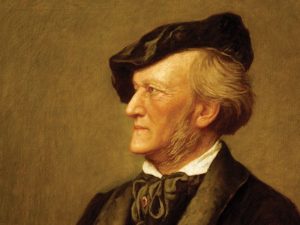
Richard Wagner
As to the tremendous impression, this is how it commences. Namely at the very bottom of Germany’s mighty river Rhine. There a trove of gold lays embedded in a reef, glinting and gleaming mysteriously in the sunlight that filters through the timeless waves. Beautiful mermaids guard it on orders of their father, enjoying its dazzling radiance, cajoling and wriggling their lovely bodies in the bright reflection. Until one Alberich crawls out of the deep, a stunted Nibelung and Son of the Night who beholds the maids with greedy eyes. When he tries to seduce them, they only laugh, pull his beard and taunt him. Enraged, he asks about the significance of the gold. Carelessly they tell him that unlimited Power to rule the World is in store for the one who will forge a Ring out of the precious metal. But, they also warn him, this feat is only possible if he renounces forever the Power of Love. It takes Alberich only a moment to make up his mind.
The World as heirloom would I gain!
And if I cannot have Love
Might I not cunningly extort Lust?
The Light will I extinguish for you
The Gold will I tear from the reef
And forge the avenging Ring!
Let the Waves be my witness:
Forever have I cursed love!
He rips the gold from the rocks and forges the Ring to rule the World with cunning and brute force—and of course without Love.
“My Ring and Wagner’s were round, but there the resemblance ceases!” scoffed Tolkien rather maliciously after his book had been published in the mid-fifties. Which is so transparent a denial that it seems almost laughable. Shaw’s aforementioned essay The Perfect Wagnerite, nearly of book-length, much acclaimed and widely read, must have been known in detail to Tolkien as well. Because his Ring and Wagner’s are identical in theme and essence, twins in fact if only in a different quality of clothing. Meaning that the former, compared to Wagner’s peerless magnum opus, is over-large and very entertaining, but not really a masterpiece of literature in the classical sense. Interesting might be that Tolkien uses words like Mordor or Sauron, clearly derived from the German Mord, or murder, and Sau, or sow. Though his claim that his own name derived from the German tollkuehn, meaning extremely foolhardy, seems unlikely since it doesn’t exist as a family name.
As to the deeper meaning in both cases, it is important to know that the one Ring of Power has no magical potentials as we understand them. It cannot destroy enemy armies simply by an order of its bearer. It cannot make you fly. It cannot stop the flow of time. It can’t even prevent you from getting wet if it rains. It can make you invisible, true, but that is just an illusion. And you’d still get wet in any case. So what is it really?
It really is only GOLD! And isn’t that enough to rule the world?
For many of those who had witnessed the last decades of the great European Empires, a reign of peace and general improvement that ended abruptly and horribly with World War One, the era afterwards must have seemed like the proverbial devaluation of all values. Because the bankers and Philistines, already so powerful in Wagner’s times, had by now metastasized out of all proportion. Germany, down on its knees, was hardest hit. During the ill-fated and debt-ridden Weimar Republic the country’s capital, Berlin, boasted 115 banking institutions of which 112 were Jewish-owned. The same ratio was true for innumerable cabarets and brothels where girls and boys as young as ten years old sold their famished bodies to the new caste of money acrobats. As to the banks, they used the country’s catastrophic finances to their advantage and tricked and forced the starving population out of their assets, be it shares, shops, houses, farmland, factories or newspapers, until half of Germany was in the hands of a very few. The same happened, though much less drastically, in much of the Western World and resulted finally in the cataclysmic Black Friday. An exercise, as the Orc-faced Robert Fuld of formerly Lehman Bros. has informed us so brazenly, where we ruin a national economy and pick up the bits and pieces for a song.
Now it must be remembered that in those years public opinion was on the whole far less brainwashed than today. No Holocaust had yet been invented to slap down undesirable critics, no worldwide Media Mafia could tell you convincingly that a crock of shit is a pot of gold. Thus in many of the national and international gazettes, accounts of thefts, crimes and injustices abounded, backed up with caricatures of the cruel and greedy Jew.
Accounts that surely have been observed and considered by Tolkien as well. Therefore it seems highly plausible that the Ring he began to forge in his mind during the early Thirties wasn’t so very different from the one Wagner had invented a hundred years earlier. Particularly if we remember a rather interesting detail, namely that indeed one Aragorn strode out of the wild and re-forged the sword that was broken. A man not of royal descent, it is true, but some kind of Mahdi or Sent-One, as Carl Gustav Jung has called him. Very powerful, a great orator, fearless too, and immediately setting to work and succeeding, almost overnight, to break the Ring’s terrible stranglehold. A feat he brought about by throwing worthless paper money out of the window and replacing it with barter based on real goods and honest work.
Well, we know what became of him and his folks, and how dearly they paid for an attempt that endangered the supremacy of Sauron’s banking institutions worldwide. The latter regrouped, giving his Ring full play, and Germany’s ancient cities and their innocent inhabitants, millions of them, perished in a Firestorm of unimaginable magnitude and barbarity. A sad moment in our great Christian European history, you will agree, and its final curtain fittingly drawn by one of its greatest conductors, Herbert von Karajan, who performed on the eve of Berlin’s destruction the Ring’s last episode, Twilight of the Gods.
As for the Sent-One, there comes a day when he will be assessed more objectively and not just demonised out of all proportion. Some of the most hideous accusations levelled against him might crumble like a house of cards in a cloud of dust about as big as the [WTC collapse]. Which could result in two schools of thought, namely one where he remains indeed a villain, and another that pronounces him the most tragic character that ever walked the earth. Him and his people. As for myself, I still have to make up my mind.
As for Tolkien, nearly twenty years went by between the Ring’s first written page and its publication. A time span that radically changed the face of the world, including the book market. Which ended up, to a large part and small wonder, in Sauron’s hands as well. Thus it doesn’t come as a surprise if Sauron’s chronicler got somewhat mum and choose to refute any familiarity, let alone indebtedness, with and to his German forbear. And so removed any ideological obstacles and cleared the way for a tremendous literary success.
A success most certainly deserved, with the one little setback that we will never know what kind of Secret Fire the old wizard Gandalf the Grey has been serving, and which he so mightily evoked when he smote the Bridge of Khazad-Dùm from under the Balrog’s fiery feet. The latter an intriguing name, particularly if you keep in mind that Baal is the Canaanite god of fertility who demanded human sacrifices, and Rog the Hindi word for malady.
As for the rest of the world, the question is of course of how far the Lords of the Ring have succeeded to enslave us. Logically speaking, and seeing their immeasurable wealth and nearly unlimited influence, they should have long since consolidated the realm. Which seems indeed the case in most Western countries where presidents, prime ministers and chancellors are their obedient marionettes. Ring Wraiths, Tolkien has called them fittingly. Men and women like you and me, but empty-eyed. Outer shells of their former selves who command us to abandon our morals and artistic heritance, fight proxy wars for their masters, pay any amount of money into their purse, and generally order us to be at their service whenever it pleases them.
Yet something went badly wrong.
To begin with, the Shadows have been torn from the Land of Mordor, a mysterious region shrouded in deep secrecy for hundreds of years, but now glaringly illuminated. So much so that its schemes and crimes are every day more clearly observed and understood, be it the corruption of politicians, the doling out of jobs to foreign countries, the true intent behind globalism, the giant thefts, the resulting economical upheavals, the unspeakable atrocities in the occupied territories, the bungled assassinations, to name but a few.
Next come the Ring Wraiths, perhaps Tolkien’s finest invention. Enablers, Paul Gottfried has called them, and deems them worse than their criminal masters. Men and women who once possessed Christian souls and knew about the Power of Love, but sold both for thirty pieces of gold to forge their own insignificant rings. Trinkets that serve for a few brief years to ride the crest of power until a new contender wins the upper hand and sends them packing. Which is usually sweetened with honours and compliments to ease the approaching twilight years, a time when the ghosts and corpses of the past begin to whisper in the dark and the hour of reckoning draws close, slowly but inevitably.
Today this kind of sugar-coating can have a sour aftertaste, due to an unforeseen invention called the Internet which markedly diminished the control of the Media Mafia and its sniffing, lying, cajoling, mudslinging lackeys. That is why the Bushes and Blairs of this world have become lepers instead of paragons, with motions underway to hold them responsible for their crimes, including the death of countless women and children and that of many fine soldiers whose intentionally poor equipment has prolonged the conflict to this day.
Finally the Dark Lords themselves.
Those who have already entered the twilight years, like the one on top of this little essay [George Soros – I have omitted the images of the original article], watch with silent horror how the mountains of gold are seeping like water through their fingers, leaving them empty-handed and with nothing to bargain on Judgement Day. As for the others, still springy and enterprising, it is said they are preparing for the ultimate Armageddon with their nukes, viruses, bacteria, cheque books, connections and what not. And perhaps they do, because they see that the world has tired of them, of their lies and extortions. But if they do, they’ll have to fight themselves for a change and not let others do the dirty work. Which will result, as a kind of divine retaliation and since they are so few, in the final destruction of the Ring and the utter defeat of its forgers.
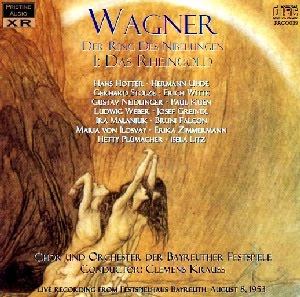
Because once, long ago, when tempted by a hoard of gold deep in the River Rhine, they made the wrong choice and… forever cursed the Power of Love.
 After the destruction of the Ring and the downfall of the Dark Lord, Frodo, Sam, Merry, and Pippin return to the Shire only to find that it has been seized by aliens who have enslaved and robbed the hobbits and ravaged the land.
After the destruction of the Ring and the downfall of the Dark Lord, Frodo, Sam, Merry, and Pippin return to the Shire only to find that it has been seized by aliens who have enslaved and robbed the hobbits and ravaged the land.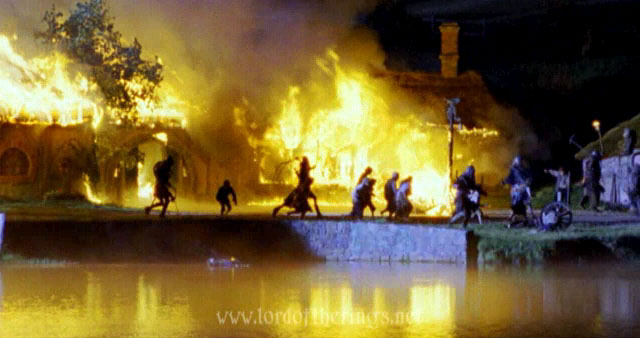 Thus “The Scouring of the Shire” is a political allegory applicable not just to England but to all forms of Jewish subversion of traditional society.
Thus “The Scouring of the Shire” is a political allegory applicable not just to England but to all forms of Jewish subversion of traditional society.
